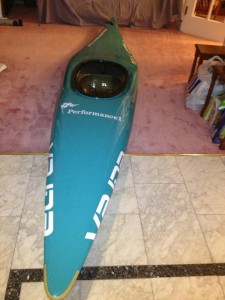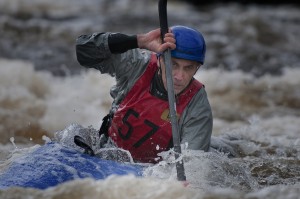2013 is shaping up to be a big year for me. For a start I turn 50 this month and that feels like a significant milestone. It’s also a year in which the quadrennial World Master Games takes place, and there’s a slalom event at Ivrea in early August. http://www.torino2013wmg.org I decided a couple of months ago to make this my major paddling focus, so I bought a new slalom boat and I’ve been training regularly since the end of the summer. This means paddling on whitewater 2 – 3 times a week, plus circuit training, Pilates and running. Having the Lee Valley Whitewater centre just down the road is a huge factor – it’s fantastic to be able to slip out after work for a training session on a world-class course.
I’m going to document my journey to the Masters Games in this blog, focusing on my mental preparation and how I apply all the stuff I’ve learned as a coach and sport psychologist over the years – a personal case-study if you like. This feels slightly risky, and I wonder how honest I’ll be able to be with what I write because there’s an element of ‘unfinished business’ for me as a slalom competitor. I ended my first slalom career in 1990 / 91 feeling unfulfilled about what I’d achieved internationally. This was one of the reasons I pursued my career in sport psychology, because I was determined to get to the bottom of some big questions about performance. Of course performance requires more than just the right mind-set, and looking back I can see many ways in which my technical and physical preparation could have been better too.
So the first question to consider is, “what are my goals for the World Masters Games? ” When I ask this question of athletes I usually get a range of responses that are either outcome based (e.g. win or finish in a particular place) or performance based (e.g. to achieve a certain score, run a particular time, throw a certain distance). More rarely, athletes offer process goals that define how they want to perform instead of what they want to achieve. Getting the right balance between outcome and process goals is tricky, because thinking too much about the outcome of a race can lead to anxiety. Yet to not think about the outcome takes away the whole spark of competition.
I had a real insight into this at my last Division 1 slalom races at Serpents Tail in Wales. I was in good form, and after my first run was sitting 4th overall and leading the masters age group. I noticed the temptation to think ahead to the possible outcome of winning the event. From personal experience and through my work with many athletes I know how distracting this thought can be during a competition. I was able to acknowledge to myself that whilst I might like to win, what I needed to do was bring my attention back to the ‘here and now’ of my immediate activity. This made it easier for me to laugh at myself when the thought of winning arose – which it did from time to time – and to simply bring my attention back to where it needed to be. I’m sure that my regular meditation practice helps with this, because it strengthens my ability to notice a thought and ‘let it go’. On this particular weekend it worked well too, because I paddled well and won my age division on both days of racing.
I’ve come to define the right mindset as Mastery Motivation, which shows up as a positive and professional attitude, an active desire to compete, and a commitment to excellence. Athletes with strong Mastery Motivation will seek out competition and look forward to it positively rather than with any sense of fear or threat. An athlete with this motivation seeks mastery over themselves and the event itself – and in slalom this is only partially defined by the race outcome.
So back to my goals for the WMG: I want to get to the start-line in August feeling healthy, fit and well prepared. I want to produce a race performance that leaves me feeling satisfied that I’ve done as well as my previous training suggests I can. If my preparation goes well, this should mean I paddle the course clean and with no major time errors. These are all process and performance goals that I can directly influence and to some extent control – but what about the outcome? I haven’t raced at a WMG before, I don’t know who else will be racing or what the standard will be. So the outcome is unpredictable and out of my direct control and it feels both risky and unrealistic to nominate any particular result as a goal – especially here in a blog that at least some people will read. But deep down I know that I’d love to win, and I find the possibility both exciting and motivating. So one of my challenges in the months ahead is to acknowledge and use my ego’s desire to win in a productive way. Like when a gym session start to burn and I need to push out another set, or when it’s cold and wet outside and I’ve planned to go training. These are good times to visit the thought of winning. The harder task is to continue to laugh at my ego’s desire to win when I’m in the heat of competition, and develop the discipline to stay fully focused on the demands of each moment.
I’m looking forward to the challenge!
Add your comments here and stay in touch via the Facebook page




